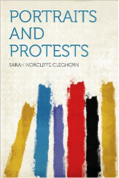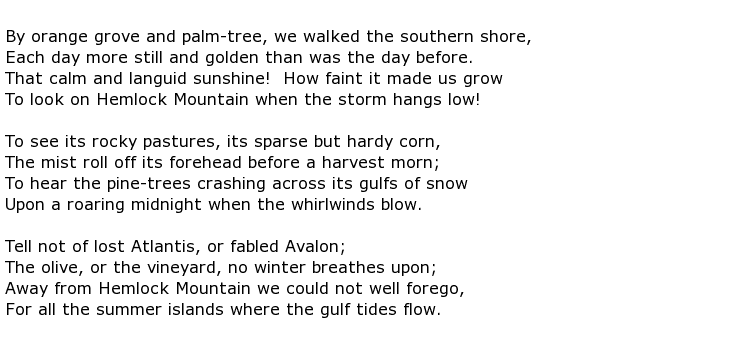 Sarah Norcliffe Cleghorn was an American poet, essayist and short story writer who was closely associated with the 20th century American Naturalist literary movement. Robert Frost famously called her “saintly” and he was quoted as follows:
Sarah Norcliffe Cleghorn was an American poet, essayist and short story writer who was closely associated with the 20th century American Naturalist literary movement. Robert Frost famously called her “saintly” and he was quoted as follows:

She was born on the 4th February 1876 in Norfolk, Virginia, curiously in a hotel as her parents were visiting the area at the time. She grew up around Minnesota and Wisconsin although, by the age of nine, she moved with her sister to Vermont after the death of their mother. They were cared for by aunts and Sarah spent most of the rest of her life in Manchester, Vermont. Her education began at a seminary in the town and then Radcliffe College, from where she obtained a BA in literature at the age of twenty.
She grew up a devout Christian with a strong social conscience. She was very aware of the poor working conditions endured by many women, and especially children, in factory environments and her famous poem, The Golf Links, came out of one observation of this kind of industrial strife.
Her poetry was mostly of a didactic nature, reflecting her strong faith although it was not until she was forty one years old that she published her first collection of work. In 1917 Portraits and Protests was published and it took until 1945 before the next collection. This was called Peace and Freedom. In between these two events she published her autobiography (in 1936) and she got Robert Frost to write the introduction to it.
She was very much a radical in both thought and deed. She was a fervent supporter of anti-vivisection, women’s suffrage and prison reform. She was very much a pacifist and campaigned strongly against lynching and the death penalty. She abhorred the sight of children slaving away in factories and one day she noticed that the incumbents of one establishment in South Carolina had a perfect view of men playing golf alongside their building, out in the sunshine enjoying themselves of course. She wrote a four-line quatrain called The Golf Links, and here it is:

This was incorporated, in 1916, into a much larger piece of work with the title Through the Needle’s Eye. As was the case with most poets she associated with others of the same persuasion and her contemporaries included Frost and Dorothy Canfield Fisher, along with others of the American Naturalists movement. Her early work was of a fairly light nature, espousing the joys of country life. She called these poems “sunbonnets”. Here is a typical example, called Hemlock Mountain:

Later on, as she became embroiled in social injustices, she produced what she called “burning poems”. One particular incident disturbed her greatly, where she read about a negro being burned alive by white neighbours. Shocking though the crime was, she was struck by how little publicity it received.
Some of Miss Cleghorn’s poetry found a home in the Atlantic Monthly magazine and she did a little teaching at two colleges in their English departments. Her burning passion though was social activism and she continued campaigning against many forms of injustice all her life.
Sarah Norcliffe Cleghorn died in Philadelphia on the 4th April 1959 at the age of 84.

